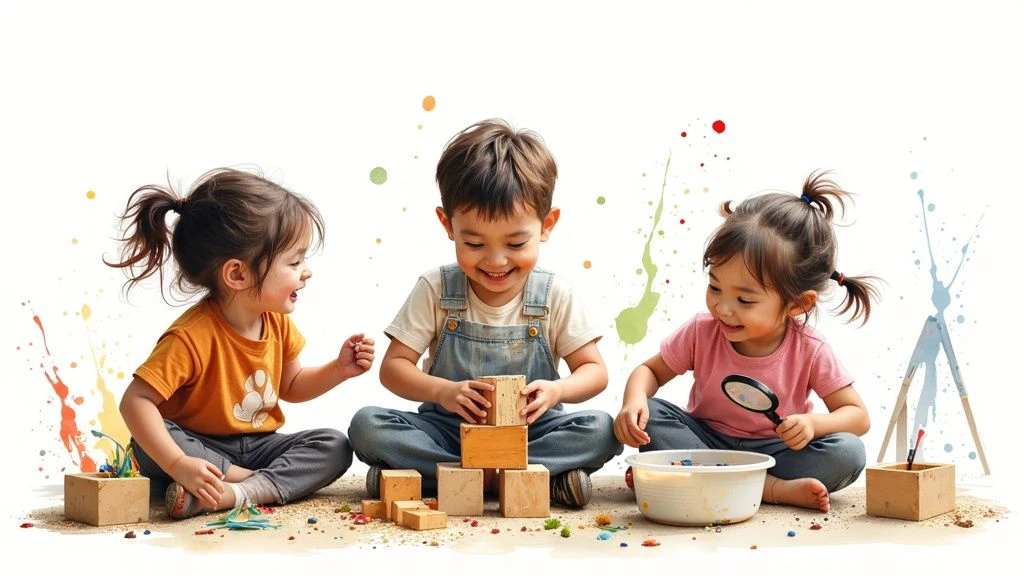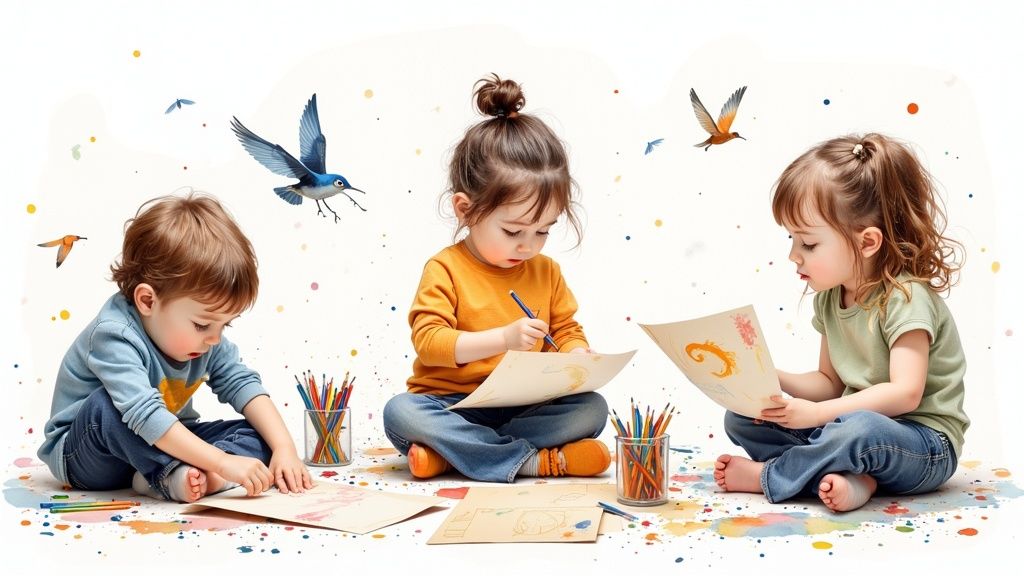Inspiring Activities for 5 Year Olds: An Evidence-Based Guide to Meaningful Learning Through Play
February 8, 2025

Building Number Skills Through Playful Math Exploration
Five-year-olds adore discovering new things about their world. This natural curiosity creates the perfect opening to introduce them to the magic of math. Rather than drilling abstract concepts that can confuse young minds, we can turn mathematical ideas into fun, hands-on activities that capture their interest.
Hands-On Activities: The Key to Mathematical Understanding
Young children learn math best when they can touch, build, and play with physical objects. One simple but powerful activity is "Number Towers." Kids use building blocks like Duplo or counting cubes along with number cards to create towers matching each number. This helps develop 1-to-1 correspondence - a key skill for basic counting. For example, when a child picks a card showing 5, they build a tower using exactly 5 blocks, counting each one as they go. Beyond counting practice, this activity helps develop fine motor control and coordination. Find more counting games here: Counting Activities for Preschoolers.
Integrating Math into Everyday Routines
Math learning happens naturally during daily activities. Have your child count plates while setting the table, match socks during laundry time, or count apple slices at snack time. These simple moments help kids see how numbers connect to real life. For more ideas, check out: Age-Defying Cognitive Development Activities Blueprint.
Creating Engaging Math Games
Make math practice feel like playtime with these simple games:
- Number Hunt: Hide number cards around the room for your child to find and identify
- Shape Sorting: Group blocks or household items by their different shapes
- Measurement Fun: Use measuring cups and spoons during baking or water play to explore basic measurement

Fostering a Love for Math
When math feels fun and connects to everyday life, kids develop positive feelings about numbers from the start. This early foundation built through play and exploration helps prepare them for more complex math concepts later on. The goal isn't to rush learning - it's to help your child discover the joy of mathematical thinking at their own pace.
Unlocking Natural Curiosity Through Outdoor Discovery
Kids have an amazing ability to learn through play and exploration. Making outdoor spaces into places of discovery helps 5-year-olds develop both their minds and bodies. Let's look at how we can create meaningful outdoor experiences that help children explore while building their observation and thinking skills.
Engaging Nature Walks: More Than Just a Stroll
Turn a simple walk into an exciting journey of discovery. Guide your child with questions that spark curiosity - "Can you spot the biggest leaf?" or "What's making that interesting sound?" This encourages them to really look at their surroundings. Let them gather natural treasures like pretty rocks or unusual leaves to examine when you get home.
Purposeful Scavenger Hunts: A Quest for Knowledge
Kids love searching for hidden treasures. Make a simple list of things to find - maybe "something soft" or "something that sparkles in the sun." This gets them using all their senses to explore. You can even match the hunt to what they're learning, like finding items of certain shapes or colors. As they figure out where to look, they're building problem-solving skills.
Cultivating Environmental Awareness: Understanding Our Planet
When children connect with nature early, they learn to care for our world. Simple activities make a big difference - planting seeds, watching bugs, or making a cozy spot for birds. Talk about how we can help take care of plants and animals. These early experiences often grow into lifelong care for the environment.
One fun activity combines counting with nature exploration. Take a walk and collect different natural items along the way. Your child might find 10 pebbles, 5 twigs, and 3 acorns. Help them make a simple chart showing what they found - it's their first step into working with data! Learn more about teaching kids about data here: Activities to Introduce the World of Data to a Child.
Adapting Activities Across Seasons: Year-Round Exploration
Every season brings new ways to learn outdoors. Fall means collecting colorful leaves for art. Winter lets us spot animal footprints in snow. Spring shows us tiny seeds becoming plants. Summer brings chances to play with water and watch busy insects. Through these activities, kids see how nature changes through the year.

When we help kids explore outdoors, we're giving them much more than fresh air and exercise. We're helping them develop key skills they'll use throughout their lives. Most importantly, we're nurturing their natural sense of wonder about the world around them.
Mastering Motor Skills Through Sensory Exploration
For 5-year-olds, sensory play is more than just fun - it helps build essential motor skills and cognitive development. Through hands-on exploration of textures and materials, kids form vital brain connections that support growth. Let's look at practical ways to set up, manage, and customize sensory activities.
Creating Engaging Sensory Stations
Setting up dedicated sensory stations gives kids a focused space to explore. Here are some easy-to-create options using basic materials:
- Water Play: Fill a basin with water and add measuring cups and toys. Kids can pour, splash and experiment with volume while building hand-eye coordination and motor control.
- Sand Play: A simple sandbox or bin with shovels and molds lets children dig, construct and get creative while strengthening their hand muscles.
- Play Dough Fun: This tactile material builds hand strength through rolling, squeezing and shaping - skills needed for writing and other fine motor tasks.
These stations help 5-year-olds channel their energy while improving focus and concentration.
Managing Sensory Activities Effectively
Good management maximizes the benefits of sensory play:
- Defined Spaces: Use mats or trays to create clear boundaries for each activity. This contains messes and helps kids stay focused.
- Time Limits: Set clear start and end times to prevent overstimulation and make transitions easier.
- Cleanup Routine: Get kids involved in cleanup with child-sized tools. This builds responsibility and keeps the space ready for next time.
These simple strategies keep sensory play positive and productive.
Adapting Sensory Experiences
Since every child learns differently, it's important to provide variety:
- Varying Textures: Include smooth stones, rough bark, and other textures so kids can explore and discover their preferences while building sensory awareness.
- Sound Integration: Add nature sounds or gentle music to engage auditory learners.
- Movement Opportunities: Combine sensory play with physical activities like dancing with scarves or tossing beanbags to help kids connect sensations with motion.
Five-year-olds especially benefit from activities mixing movement and sensory input. For instance, try a "Hunt for Numbers" game where kids search through a sensory bin for number cards to match with a key. This builds number skills while developing coordination. Learn more: Math Activities for Preschoolers.

With thoughtful setup and adaptation of sensory activities, we can help 5-year-olds build essential motor and cognitive skills while fostering their natural love of learning. These experiences create a strong foundation for future growth.
Fostering Creative Expression Through Artistic Discovery
Five-year-olds have incredible imaginations just waiting to be unleashed. This age is perfect for introducing art as a way to help them grow and learn. Art activities do much more than create pretty pictures - they help develop key skills that will benefit children for years to come.
Creating a Nurturing Art Space
Set up a special art corner, even a small one, to show your child that creativity matters. Stock it with essential supplies like crayons, markers, paint, paper, and play dough. You might find helpful ideas in this guide to Creative Expression Activities. Keep supplies organized but within reach so kids can choose materials on their own - this builds independence and confidence.
Starting Simple, Growing Skills
Begin with basic activities like coloring and drawing before moving to more complex projects. Try making collages using different materials like fabric pieces or items from nature. Working with these varied textures helps develop fine motor skills. Add simple sculpting with play dough or clay to improve hand-eye coordination. This step-by-step approach keeps kids excited to try new things.
Letting Kids Express Themselves
Art gives children a powerful way to share their thoughts and feelings, especially when words are hard to find. Let them create freely without pushing for specific results. Ask questions like "What's happening in your picture?" or "How did making this make you feel?" This helps kids understand their emotions better and builds their confidence.
Why Art Matters for Five-Year-Olds
Art activities support many areas of development:
- Builds fine motor skills needed for writing and daily tasks
- Develops problem-solving abilities through experimenting
- Provides healthy ways to explore emotions
- Boosts self-confidence and creativity
Making Mess Management Fun
Accept that art can get messy - it's part of the learning process! Try these simple tips:
- Put down washable mats or old newspapers
- Keep art smocks or old shirts handy
- Make cleanup a team effort
- Set clear boundaries for the art area

With the right setup and support, we can help young children discover the joy of creating while building important life skills through artistic expression.
Building Social Confidence Through Interactive Play
Young children at age five show a natural enthusiasm for playing with others. When we channel this energy into purposeful group activities, we help them develop essential social skills that will shape their future relationships.
Structured Play: A Foundation for Social Skills
Simple group games provide perfect opportunities for learning social basics. Playing "Simon Says" helps children practice listening and following directions together. When kids work as a team to build with blocks, they learn about sharing ideas and solving problems. These activities make learning social skills both natural and fun.
Promoting Cooperation and Sharing
Group activities show children the power of working together. During a team scavenger hunt, kids learn to communicate and help each other find hidden treasures. Creating art as a group - where each child adds their special touch - demonstrates how combining efforts leads to amazing results that no one could achieve alone.
Developing Emotional Intelligence
Through play, children encounter and learn to handle various feelings. Games bring out emotions like excitement, frustration, joy, and disappointment. When we encourage kids to talk about these feelings and notice how others feel, they develop vital emotional awareness and empathy.
Managing Group Dynamics
Getting along in groups requires specific abilities that children can practice through play. Key skills include taking turns, listening to others, and finding peaceful solutions to disagreements. Acting out common scenarios, like practicing how to share toys, gives children confidence in handling real social situations.
Supporting Different Personality Types
Every child has their own social style - some jump right into group activities while others prefer to watch first. Creating an environment that welcomes all approaches is key. Starting shy children with smaller groups can help build their comfort. Giving each child special roles during pretend play ensures everyone can participate in their own way. With regular practice through these playful interactions, five-year-olds develop the social skills they need for lasting friendships.
Engaging Minds Through Screen-Free Learning Adventures
Kids today are surrounded by screens, but there's real magic in unplugging and exploring the world through hands-on activities. For 5-year-olds especially, screen-free experiences are essential building blocks for thinking skills, creativity, and social development.
Why Choose Screen-Free Activities?
Five-year-olds thrive when they can touch, explore, and experience learning firsthand. Screen-free play lets them develop crucial motor skills while solving problems and making sense of their world. When kids build with blocks, squish playdough, or finger paint, they're not just having fun - they're laying the groundwork for future learning. Want more creative ideas? Check out these Fun Educational Coloring Pages for Kindergarteners.
Building a Foundation for Learning
Simple everyday activities can become rich learning experiences. A walk in the park turns into a science adventure as kids collect leaves and spot different birds. Sorting laundry by color becomes a lesson in matching and patterns. Even helping set the table teaches counting and spatial awareness. These real-world experiences help make abstract concepts concrete and meaningful.
Cultivating Creativity and Imagination
Art supplies and open-ended materials spark endless possibilities for creative expression. Give a 5-year-old crayons, paper, and clay, and watch their ideas come to life. Building blanket forts, putting on puppet shows, and playing dress-up help kids develop storytelling abilities and creative thinking. This unstructured play encourages them to experiment, problem-solve, and express themselves freely.
Developing Social Skills Through Play
Playing with others is how 5-year-olds learn essential social skills. Board games teach turn-taking and fair play. Group activities like tag or building with blocks help kids practice cooperation and communication. Research shows that children who regularly engage in social play are better at understanding others' feelings, resolving conflicts, and building friendships that last.
Creating Lasting Enthusiasm for Learning
By mixing different screen-free activities into a child's day, we help spark a natural love of learning. These hands-on experiences build confidence, feed curiosity, and develop vital life skills. The goal isn't just limiting screen time - it's opening doors to discovery, wonder, and growth.
Ready to add some creative fun to your child's screen-free time? Visit ColorPageAI to create unique coloring pages that bring their imagination to paper!
Ready to start coloring?
Join ColorPage.ai today and get 5 free credits to create your own custom coloring pages!
Start creating